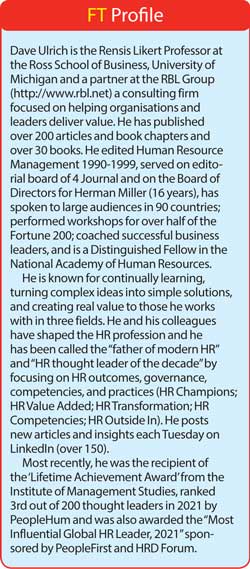Thursday Feb 19, 2026
Thursday Feb 19, 2026
Thursday, 16 December 2021 00:00 - - {{hitsCtrl.values.hits}}

Prof. Dave Ulrich
|
The last several months have seen a tidal wave of resignations, in the US and around the world. According to the US Bureau of Labor Statistics, 4.3 million Americans or 2.9% of the entire workforce, quit their jobs in August, which was a record-breaking month.
Meanwhile, more than 40% of people who responded to Microsoft’s Work Trend Index, a global survey of over 30,000 people in 31 countries, said they are considering leaving their employer this year.
Moreover, a recent survey covering 500 HR decision makers and 2,000 employees in the UK and Ireland, which was conducted by a reputed HR software company called Personio revealed that 38% of those surveyed planned to quit in the next six months to a year.
Furthermore, according to ILO’s report on ‘World Employment and Social Outlook: Trends 2021’, the economic crisis caused by the COVID pandemic is expected to contribute to global unemployment of more than 200 million people next year, where women and youth workers will be mostly affected.
Hence, there could be many reasons which contributed to the above scenario which has resulted in a ‘Great Resignation’. The reasons could range from shifting priorities to the way their employer treated them during the pandemic, but the outcome of this Great Resignation is that employers are scrambling to come up with innovative ways to attract and retain employees.
Prof. Dave Ulrich, the father of Modern HR, shares his perspectives on this new phenomenon called the ‘Great Resignation’ and how employers could combat the negative repercussions of the same. Here are excerpts of the interview:
By Sonia Chinnaiyah Thayakaran
Q: The ‘Great Resignation’ has created hiring challenges for companies and left millions of jobs unfilled. Based on your opinion, why have millions of employees planned to switch jobs post-pandemic (i.e., ‘new normal’)?
The Great Resignation, or spike in talent mobility, should not be a surprise. Many employees have spent the last 18+ months sequestered, often working alone at home with most work connections through technology. Other employees while physically at work have also been socially isolated with safety protocols limiting personal connection.
With more personal time to ponder and with fewer work related social connections, employees feel less attached to their teams and organisations and more willing to explore job and career options.
Q: You proposed Leadership Code 3.0 in July 2020, to capture 10 requirements for leaders, in order to discover and maximise opportunities during crises situations. Based on the new leadership requirements, what’s your advice to employers, which could help them to be more effective to handle this influx of resignations?
To create a better employee experience, leaders need to go beyond listening to hearing employees. Listening means that employees share information; hearing means that leaders receive information with empathy. Empathic leaders eschew the many “isms” that filter thinking and action (e.g., racism, sexism, classism, elitism, ageism, and so forth) and help others feel appreciated for their unique talents and gifts.
The crises in our world have also created an emotional malaise that leaders need to appreciate. Being an empathic leader requires recognising personal biases and malaise and modeling how to overcome them. When employees feel “heard,” they are more able to feel connected, stay at their company, and then more able to contribute to a positive workplace that leads to marketplace success.
Q: How can key business leaders from the private, public and non-profit sectors realign their work practices so that the ‘Great Resignation’ can create many opportunities and not threats?
Remove low value-added work. Employees may be more likely to leave when frustrated by the bureaucratic folderol they face. One company who lost 20% of their employees committed to reduce workload at least 20% so that the remaining employees were not burdened with performing others’ work. The remaining employees looked at reports, approvals, meetings, measures, policies, and procedures that were not adding value
and were able to remove these administrative burdens to make their work more appealing. Using people’s resignation as an opportunity to re-examine the work process and remove low value-added work helps retain good people.
|
Q: Could this ‘Great Resignation’ bring about meaningful, long-term changes to workplace culture and the way companies invest in their employees?
Reinvent the work setting. Employees who have been working remotely and return to the office should not just do the work they did remotely. If someone comes to work to merely repeat what they had been doing from home, then they are more likely to consider moving on.
Office spaces should be forums for social cohesion and the right culture through collaboration, creativity, and connections. Employees come together to work together, not to isolate.
connections. Employees come together to work together, not to isolate.
Personalise work: Mass customisation has occurred in made-to-order products or services that meet unique customer requirements. Likewise, personalisation occurs with employees in two ways. First, treat each employee as a “person” respecting their unique lifestyle and skills by expressing empathy and sharing emotion at a personal level. Second, be flexible to the unique employee circumstances. For example, hybrid work means that employees may work from whatever location works best for them. Work engagement means that employees appropriately participate in work decisions that affect what they work on and how they work. Of course, many jobs require in person work, but even these jobs may be personalised by both caring about the employee and by inviting the employee to co-design ways to improve the job.
Q: How should the HR Department be organised? Should they give more priority for their HR roles or to build relationships to combat the ‘Great Resignation›?
Many seek HR role clarity: who will do what work (centres of expertise, embedded HR, shared services, outsourced work, or corporate functions)? This often leads to a RACI (responsible, accountable, consulting, informed) decision discussion to clarify roles and expectations.
I recently realised that in over 40 years of marriage, Wendy and I have never sat down and done a RACI on our family tasks. We have formed a relationship that lets us move quickly to accomplishing tasks without formal role clarity.
Likewise, our research shows that the right HR organisation is less about roles and more about relationships. Instead of seeking role clarity, pursue relationship upgrades by discovering common goals, being positive with each other, responding to bids, sharing dreams, and working better together.
Q: Many surveys suggest that a hybrid model of in-person and remote work would surely continue in the aftermath of this pandemic, but bosses need to customise this model according to their business needs and employees’ needs. So, how can employers and employees be ready for the future of work?
The future of work is less about where (home, office, remote site) and how (technology vs. face-to-face) work is done and more about why and what is done. In both virtual and in-person presentations, employees want to share ideas that will have an impact (why we work) by offering innovative ideas in an engaging way (what we do).
For business and HR leaders, the why of work is about adding value to the marketplace (customers, investors, communities) by ensuring that each employee both finds personal meaning at work and connects daily work to customer value—no matter where that work is done.
|
Q: Due to the influx of remote and virtual jobs, leaders are now out of touch with their employees. What’s new and unique about ‘employee experience’ and ‘psychological safety’ that will improve understanding of their employees which will ensure their retention?
Employee experience has become a critical element of the work experience as employees believe (find meaning), become (learn and grow), and belong (connect with others). Employee experience is a lead indicator of customer experience and investor confidence.
Almost everyone has personally experienced both a safe and unsafe work setting. In today’s current crises, leaders need to be even more focused on creating a safe environment for employees to share their personal and professional fears and anxieties. When employees can honestly share their concerns about emerging work requirements, social injustice, and career opportunities, employees feel heard and more connected to a community. Leaders create safe spaces by modelling values they expect of others.
Q: What are your suggestions to help employers combat digital burnouts, zoom fatigue, etc. amongst the workforce and ensure remote working adds value to business success?
While demands have increased, let’s look at resources to counteract these demands.
1. Physical: How are your habits around nutrition, exercise, sleep, meditation, physical space, finances, and daily chores? These basics are often the first to go when stress ratchets up, yet fatigue compromises decision making, undermines confidence, and leads to burnout.
2. Emotional: Skills for optimism, self-compassion, confidence, and humour can be learned. When you’re feeling irritable, ask yourself what you’re afraid of—identifying that underlying fear can help reduce its potency. Many are using this time out to improve personal habits (exercise, nutrition, sleep), and others are learning new skills (we are learning to read subtle cues through technology connections and to read).
3. Social/Relationships: Work is a team event. Take time to connect with colleagues who offer support when things are difficult. Uncertainty puts us all on edge, so help everyone remember to practice (and practice yourself) patience, forgiveness, apologies, compassion, listening, and appreciation, and help each other get back on track when you slip, even through technological connections.
4. Intellectual/Accomplishments. Anticipate and create the future by increasing skills and creativity today. Harness the creativity inherent in uncertainty by taking risks and learning from both mistakes and small, incremental accomplishments that build on each other.
5. Spiritual/Meaning. Discovering our values, goals, identity, and sense of purpose gives meaning and direction to our lives. Create your individual language of spiritual growth (like the five love languages) include meditation, time in nature, community gatherings, service to others, reading sacred texts, worship rituals, music, hobbies, volunteering, or prayer.
Q: What’s your advice for employees who are planning to quit jobs these days?
Some career advice:
Focus on what is easy, energising, and enjoyable … three criteria for a good job
Don’t run up sand dunes … figure out what you can and cannot easily do and do it. I would like to have played professional sports, but … can’t jump, not coordinated, and not competitive enough.
Relationships matter more than products … nurture good relationships with people who will come back later to help you
Learn, learn, learn. … what worked? What did not? Why? How could I have done that differently? What would I do next?
Do hard things … find something that stretches you and makes you learn … not all the time, but it gets you out of your comfort zone and opens doors.
When in doubt, try it … what is the worst thing that can happen to me? Ask this and move on.
|
Q: What are your key learnings from this pandemic?
Like everyone else, I have experienced dramatic change (e.g., I am no longer a celebrity flier on two airlines, but doing oodles of webinars, interviews, research studies, and podcasts from my home office). I am learning to learn and appreciate the value of new insights and approaches. I am ever more aware of the importance of human capability, built on relationships of trust. Curiosity, relationships, research, ideas with impact, relevance, paradox, personalisation, agility, self-care are the terms on my mind and personal learnings.
(The writer is a freelance senior HR consultant, visiting lecturer. She can be contacted on [email protected] or www.linkedin.com/in/soniachinnaiyah/)